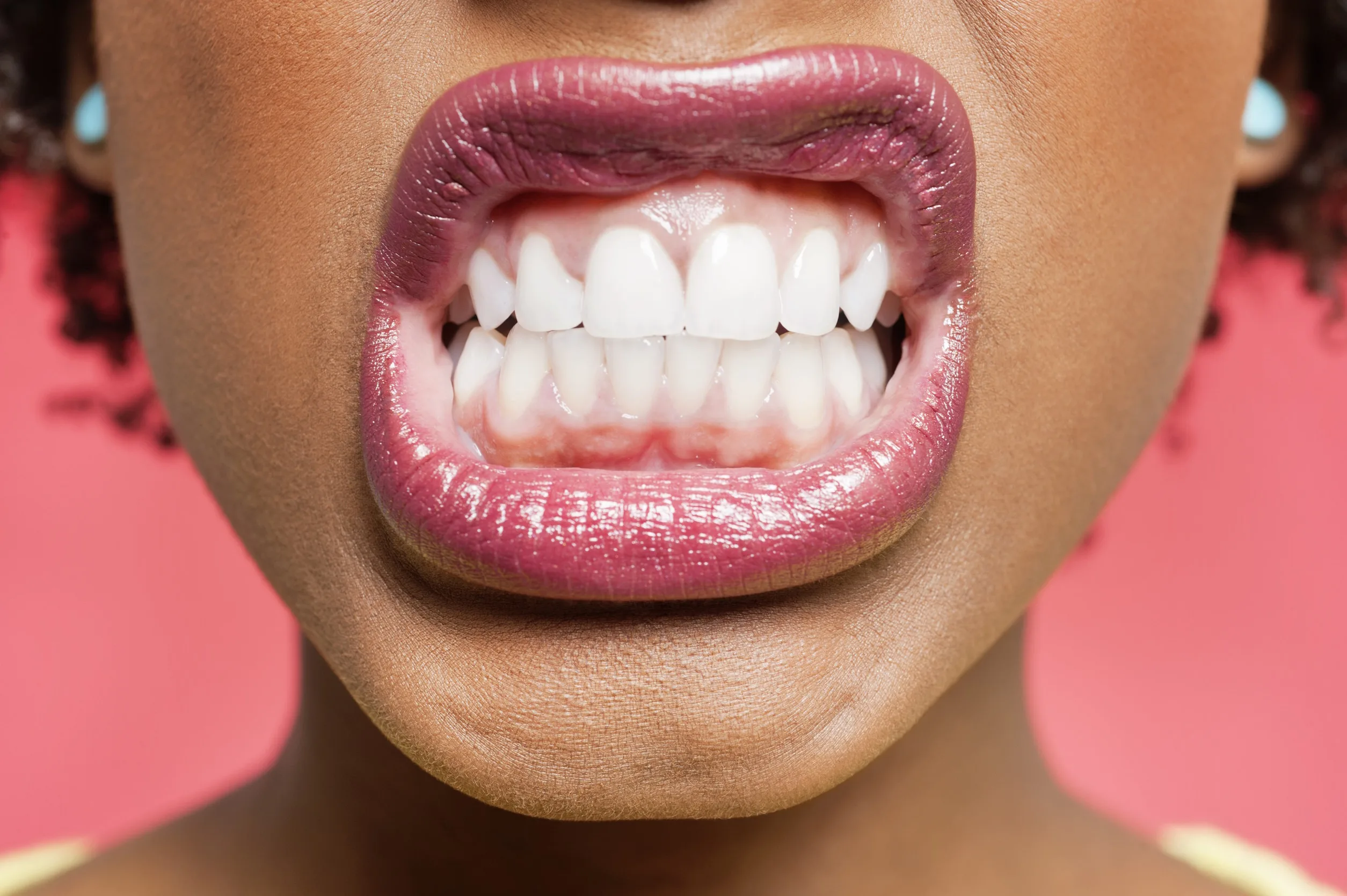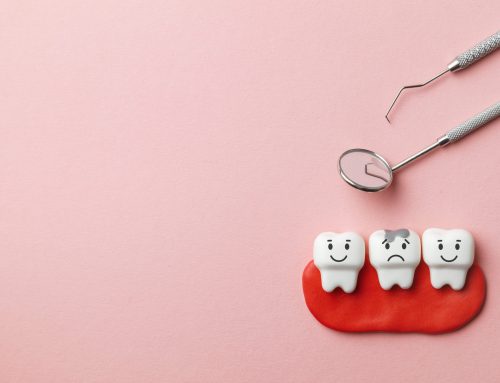Waking up with a sore jaw? Noticing chipped teeth or frequent headaches? Stress might be the culprit. While most people think of stress as mental or emotional, it can have real physical effects, especially on your teeth.
Clenching, grinding, and TMJ tension can wear down the enamel, cause pain, and even lead to long-term dental issues. But with the right awareness and care, you can stop stress from taking a toll on your smile.
How Stress Affects Your Teeth: Teeth Grinding Stress
One of the most common ways stress manifests in your mouth is through teeth grinding (also known as bruxism). More than 70% of dentists have seen an increase in stress-related teeth-grinding. People often grind or clench their teeth unconsciously, especially at night.
Over time, this can lead to:
-
- Worn enamel that weakens teeth
- Increased tooth sensitivity
- Chipped, cracked, or flattened teeth
- Jaw pain, tension headaches, and even TMJ disorders
How to Tell if You’re Grinding Your Teeth
- Waking up with a sore jaw or headache
- Noticing chipped, flattened, or worn-down teeth
- Increased tooth sensitivity to hot or cold
- Hearing clicking or popping sounds when opening your mouth
Why Does Stress Cause Teeth Grinding?
When you’re stressed, your body often responds by tightening muscles, including those in your jaw. This tension can lead to clenching and grinding, putting excessive pressure on your teeth and jaw joints. Left untreated, it can cause long-term dental damage and chronic pain.
How to Protect Your Teeth from Grinding
✓ Use a Mouth Guard: A custom-fitted mouth guard from your dentist acts as a barrier, protecting your teeth from grinding while you sleep.
✓ Manage Stress: Relaxation techniques such as deep breathing, meditation, and exercise can help reduce muscle tension and jaw clenching.
✓ Be Aware of Clenching: If you catch yourself clenching during the day, try jaw relaxation exercises and adjust your posture.
✓ See Your Dentist: If grinding is affecting your teeth, your dentist can recommend nightguards, muscle relaxant treatments, or other solutions to prevent long-term oral damage.
TMJ from Stress: The Link Between Tension and Jaw Pain
Have you ever caught yourself clenching your jaw when you’re stressed? Over time, this unconscious habit can lead to TMJ pain, making it difficult to chew, speak, or even relax your face. The temporomandibular joint (TMJ) connects your jawbone to your skull, and when stress causes you to clench or tighten your jaw muscles, it can lead to inflammation, discomfort, and restricted movement.
Signs of TMJ Pain Caused by Stress
- Persistent jaw pain, soreness, or tightness
- Difficulty opening or closing your mouth fully
- Clicking or popping sounds when moving your jaw
- Earaches or ringing in the ears (tinnitus)
- Frequent tension headaches
How Stress Triggers TMJ Pain
When you’re stressed, your body’s fight-or-flight response activates, causing muscle tension throughout the body—including your jaw. If this tension becomes chronic, the TMJ joint and surrounding muscles become overworked, leading to pain, stiffness, and even changes in how your teeth align.
How to Relieve TMJ Pain from Stress:
✓ Apply a Warm Compress: Heat therapy relaxes jaw muscles and increases circulation, reducing tension.
✓ Massage the Jaw Area: Gentle massaging techniques can improve blood flow and release built-up tightness.
✓ Practice Relaxation Techniques: Deep breathing, meditation, and stress management exercises can help prevent unconscious clenching.
✓ Avoid Hard or Chewy Foods: Soft foods can help minimize strain on the jaw during flare-ups.
✓ Consult Your Dentist: A professional evaluation can determine if you need a custom nightguard or targeted treatment to prevent further TMJ strain.
Jaw Pain from Stress: Why It Happens & How to Stop It
Many of us clench our jaws during stressful or anxious moments. Maybe you feel tightness in your face after a long day? Stress affects far more than our emotions! It creates real, physical tension, especially in your jaw.
When you’re stressed, your body instinctively tenses up, and that includes the muscles around your jaw, face, and neck. Over time, this constant tightening can lead to jaw soreness, stiffness, and even long-term pain. Chronic stress can also make you more likely to grind your teeth at night, further straining your jaw and affecting your overall dental health.
Signs of Jaw Pain from Stress & Anxiety
- Tightness or soreness in the jaw, especially in the morning
- Pain that worsens with chewing or speaking
- Frequent headaches or facial discomfort
- Clicking or popping sounds when opening your mouth
Why Does Stress Cause Jaw Pain?
Your jaw muscles, particularly the masseter muscles (which help with chewing), are some of the strongest muscles in the body. When stress levels rise, these muscles may stay tense for extended periods, leading to discomfort and even contributing to TMJ disorders.
Also, many people clench their jaw or grind their teeth at night without realizing it, which overworks the jaw muscles and puts extra pressure on the temporomandibular joint (TMJ).
How to Relieve Jaw Pain from Stress:
✓ Relax Your Jaw Throughout the Day: If you notice yourself clenching, make a habit of dropping your jaw slightly and resting your tongue at the roof of your mouth to relieve tension.
✓ Practice Jaw Stretches & Massage: Gently massaging the jaw and performing simple stretching exercises can release built-up muscle tension.
✓ Reduce Caffeine & Alcohol: Both can contribute to muscle tension and dehydration, making the jaw muscles more likely to tighten up.
✓ See Your Dentist for a Solution: If stress-related jaw pain is affecting your daily life, a dentist can recommend custom mouthguards or other targeted therapies to help protect your jaw and prevent long-term damage.
Protect Your Smile from Stress
Now you know how stress affects your teeth. If you’re experiencing stress-related dental issues, Somerset Dental on James is here to help. Our team specializes in diagnosing and treating conditions like teeth grinding, TMJ disorders, and jaw pain caused by stress. We offer tailored solutions, including custom mouth guards and personalized treatment plans, to protect your teeth and relieve discomfort.
By addressing stress-related oral health concerns early, you can prevent long-term damage and maintain a healthy, pain-free smile. If you suspect stress is affecting your teeth, schedule a consultation with us today to find the right treatment plan for you.
Stress is an unavoidable part of life, but it doesn’t have to take a toll on your smile. Your smile is worth protecting. If you’re experiencing any of these stress-related dental concerns reach out to Somerset Dental on James for expert care and solutions tailored to your needs.
Have you noticed any signs of stress affecting your teeth? How do you de-stress at the end of the day? Share your experience with our readers in the comments below.






Leave A Comment